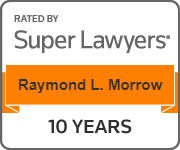RAYMOND L. MORROW
OF COUNSEL
For more than 30 years, Ray Morrow has enjoyed providing guidance, advice, support and, when necessary, aggressive advocacy for his clients. He specializes in litigation, trial work and dispute resolution, but believes that litigation avoidance is often the most beneficial option for the people and businesses who seek his counsel. Therefore, Mr. Morrow works with his clients to anticipate problems before they arise, and, if problems have developed, to carefully evaluate all options before deciding on a course of action. When litigation is the best choice or is otherwise unavoidable, Mr. Morrow’s knowledge and experience have resulted in great successes for his clients before juries, judges, and arbitrators, and in negotiation of favorable settlements.
B.A., University of Michigan, Ann Arbor, MI
U.S. District Court for the Western District of Michigan (1986)
U.S. 6th Circuit Court of Appeals (1985)
U.S. Court of Appeals, Federal Circuit (1994)
United States Supreme Court (1979)
Former American Arbitration Association, Arbitrator, Panel of Neutrals (1980 – present)
Case Evaluator for Oakland County court
Formally Trained and Active Mediator (Michigan Court Rule 2.411)
State Bar of Michigan
Oakland County Bar Association
Society of Former Special Agents of the FBI
Raymond Morrow has regularly been listed in the national Martindale-Hubbell Law Directory with an “AV” peer review rating, the highest rating given to attorneys, recognizing both legal ability and ethical standards.
Mr. Morrow has regularly been listed in Michigan Super Lawyers magazine, which features the top 5% of attorneys in Michigan, in the specialty of Business Litigation.
He was also designated a “Leading Lawyer” in Commercial Litigation (a distinction granted to the top 1% of attorneys in Michigan).
DBusiness Magazine recognized Mr. Morrow as a 2025 DBusiness Top Lawyer for his work in Construction Litigation.
Party Hosts Can Be Liable For Underage Drinkers; Commentator
Bloomfield Estates Improvement Association, Inc. v. City of Birmingham, MI, 479 Mich. 206, 737 N.W. 2d 670 (2007); Ancient deed restrictions applicable to properties within a subdivision represented by Mr. Morrow were validated and enforced by the Michigan Supreme Court in order to prevent the City of Birmingham, Mi. from a continuing deed restriction violation on a lot owned by the city within the subdivision, and despite claims by city that the restrictions had been waived
PRACTICE AREAS







